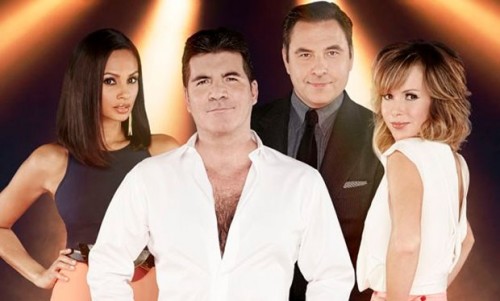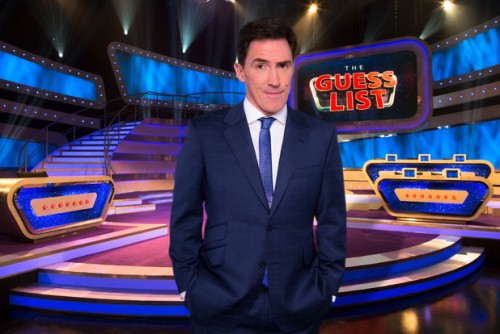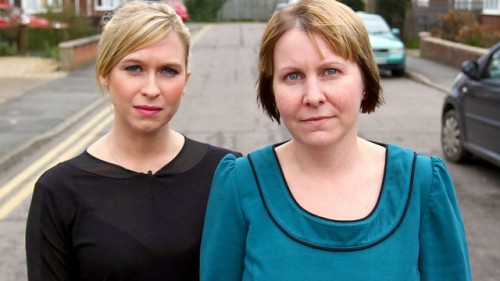THAT WAS THE BOX – April 2014 (Week Three)
‘BRITAIN’S GOT TALENT‘ (ITV – ITV PLAYER)
And here we are, with series eight of ‘Britain’s Got Talent‘. I know, you’re asking yourself, “has this really only been on eight years? It feels like an eternity” and I will tell you why. It is because these Simon Cowell vehicles are all so interchangeable, it’s hard to tell where ‘X-Factor‘ ends and ‘BGT‘ begins. We had all the usual no-hopers, like the Owl act that was verging on cruel. There is always something much more funny about a dog – which is normally so eager to please, refusing to dance or whatever, than a wild bird. We also have David Walliams pretending to flirt with Simon Cowell. The joke is wearing thin now. We all know Walliams is not gay, so why keep pretending to be? It’s frankly quite offensive. We look back at the comedians of yesteryear and their camp acts and find them distasteful, so why is Walliams any different?
I also don’t like the way the judges are greeted like returning gods. They’re four celebrities who have found varying amounts of fame and are now overpaid for judging a talent show. By the screams and the whoops from the audience, anyone would think Mandela, Ghandi, Mother Theresa and Princess Di had entered the room. Another bugbear are the shots to audience during the acts. I wonder just how many of these reactions are to the act we’re actually seeing. I once attended the recording of a television programme and they recorded our laughter to use on another show that did not receive so many laughs. Smoke and mirrors folks. Smoke and mirrors.
We had an act called Collabro – which sounds like a 1970s Ford model. There were also some people doing dancing to country and western, that for some reason made Amanda cry, and yet when the young girl with the touching story about bullying forcing her to move to Glasgow, sang, Ms Holden didn’t shed a tear. Strange that.
When I was at college doing Film Studies, we learnt about something called ‘digesis’. You’ve probably never heard of it, but you witness it all the time. The creepy music that tells you a murder is about to happen. The close up of the purse left on a counter that you know is going to be stolen. Digesis are the subtle little hints by film-makers that tell you what’s going to happen next. ‘Britain’s Got Talent‘ is full of it. An act comes on, Simon Cowell rolls his eyes and you know they’re going to be good. Some strange-looking loser boasts of his achievements and how talented he is, and you know he’s going to be crap. And the biggest contrivance came at the end of the show, when two cute kids (although the little girl did look like Amanda Seyfried’s mini me) did street dancing, and Simon Cowell went on and on about how grateful he was for them as he hated ballroom. Then, lo and behold, an old granny and young buck come on and start ballroom dancing, cue more eye rolling from Cowell. Then what happens? Granny starts being flung around the room in a dance routine which is like a vision of what Madonna will be like in thirty years time. Cue whoops and cheers from the audience and obligatory gasps from the judges. Amanda Holden pressed her golden buzzer so the old woman could go through to the semi finals, and everyone forgot that the same old girl has been on the ‘Paul O’Grady Show‘ and won the Spanish version of BGT. But we’re supposed to suspend reality and believe none of the judges had ever seen her before. It’s all getting a bit tiresome now and it would be quite nice to have some quality drama on a Saturday night for a change, instead.
‘THE GUESS LIST‘ (BBC One – BBC iPLAYER)
This new BBC quiz show wins my award for the most bizarre programme in a very long time. I literally still don’t know if it was done as a joke – like a prolonged sketch from another show. Hosted by Rob Brydon, ‘the turns’ (please do read this word in Lily Savage’s voice) were proper B-Listers – Simon Callow, Jennifer Saunders, Emilia Fox, James Corden, Louis Smith. It was like something dreamt up by Siobhan Sharpe in ‘W1A‘. Celebrities pretend they’re playing ‘Blankety Blank‘ meets ‘Family Fortunes‘, whilst Brydon plays the awkward host. Brydon is usually warm and naturally funny, but his hosting kills on ‘The Guess List‘ were reminiscent of Jim Bowen on ‘Bullseye‘, thirty years ago. He was awkward and found it hard to get a laugh out of his guests – especially Emilia Fox, who, while very beautiful, appears to have no sense of humour at all.
Playing the game was someone called Ben and a woman aged under forty called Shirley. Can you honestly remember the last time you met someone called Shirley who was born after 1960? I can’t. Shirley was planning on emigrating to Perth in Australia, and when she won the show, her prize, apparently, was a holiday in Perth in Scotland. But I’m not sure if there even was a holiday. Normally we at least see something –scenic shots and an over enthusiastic voice-over. But there was nothing. The whole thing just fizzled out towards the end. I finished watching it none the wiser and am eager to watch again next week just to see if the person wins a proper prize. Bizarre.
‘CAN CRIMINALS SAY SORRY?‘ (BBC3 – BBC iPLAYER)
It’s documentaries like this that seriously makes me question, who in BBC Land thought it was a good idea to chuck £36m at ‘The Voice‘, and in the meantime scrap BBC3. Honestly. What is more important? Yet another talent show that will produce a winner we’ll never hear of again, or a documentary looking at part of criminal justice system we might all one day encounter? The programme was fronted by Brooke Kinsella, the former ‘Eastenders‘ actress whose younger brother Ben was murdered in 2008 aged just sixteen. Brooke has become an anti-knife crime campaigner, and has worked with the government on reducing the number of teenagers killed in the same way as her brother. I could get political and point out that the conservative government, rather than invest money in the criminal justice system, are instead dismantling it and selling it off to the highest bidder, all the while using people like Brooke and Helen Newlove as the public face of their apparent interest in fighting crime; but that is a completely different argument all together and it’s important that we concentrate on the programme.
The latest government idea is to promote restorative justice, whereby an offender comes face to face with their victim and has to listen to their point of view, and Brooke investigated whether or not it is effective. She herself cannot face her brother’s killers and wanted to get inside the mind of those people who had found the courage to confront those who had harmed them. There was a varying array of results, from the woman whose son was killed in a road accident, whilst being driven by his friend. The woman does not hate the friend in any way and wants to help him. There was also the case which was straight off ‘Jeremy Kyle‘, where two women got into a fight in a club over a guy, which resulted in one of them banging her head. The victim didn’t want to meet the assailant and instead got a letter from her, which had been drafted by the police, and the assailant clearly stated she didn’t think the matter was over. So what was the point of that? Nothing had been solved and the assailant got away without so much as a criminal record.
There was the touching moment when a young homeless man who had assaulted a hostel worker met with her and after a few harsh words went from angry young man who could not make eye contact, to a vulnerable kid who didn’t like the thought of someone talking to his mum in the same way he had his victim. One of the problems with restorative justice is that sometimes offenders have never had the chance to speak up for themselves, so when faced with their victims, they may resort to anger or withdrawing into themselves as a natural defence and therefore make the situation worse.
The most ‘heart-warming’ of the tales was the prolific offender who now worked with the man whose house he robbed, to try to stop other people offending. Most shocking was the woman who was raped by her twelve-year-old pupil, and had only found closure when she confronted him once he got to seventeen.
The programme was thought-provoking. Most of us have been the victim of crime to a degree and it makes you wonder what you would do, if you were given the chance to talk to the person who had caused you distress. By the end of the programme Brooke still wasn’t willing to meet with her brother’s killers yet, but she was more willing to consider it than she had been at the outset.
Whether or not restorative justice works isn’t the point here. What is the point is that BBC3 provides interesting and informative documentaries on subjects of interest to the 16-40 age group, and I only hope that BBC2 picks up the slack once it’s off air. God forbid if all people of this age group have left to watch is ITV2.




